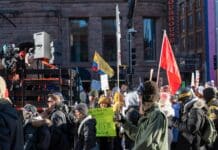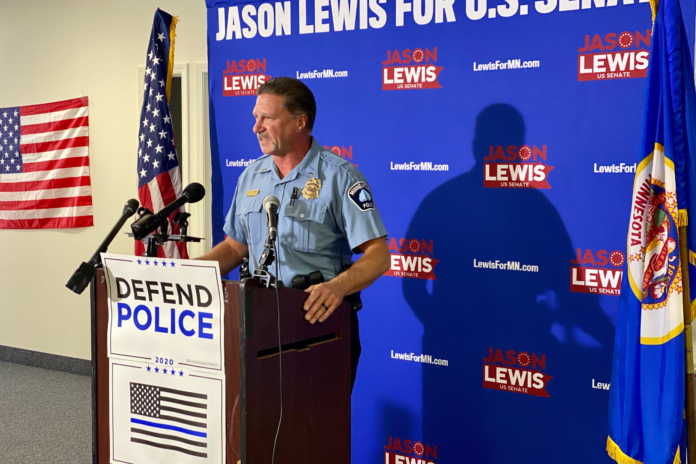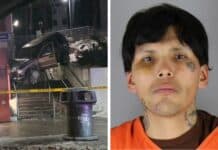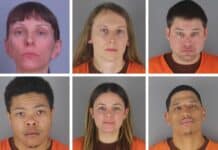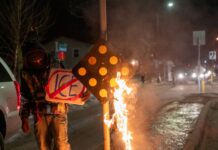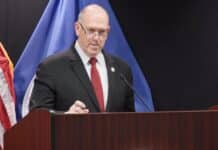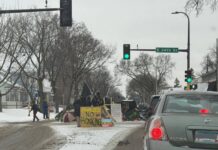Police Officers Federation of Minneapolis President Bob Kroll was interviewed on Alpha News’ Facebook live Monday night by Devin Foley, CEO of the Charlemagne Institute.
Kroll is now best known around the country as the man who dealt with Black Lives Matter protesters outside of his house in Hugo, Minnesota, this summer.
Kroll has been a Minneapolis police officer since 1989. He grew up in St. Paul and always knew he would end up as a law enforcement officer.
When asked what was going through his head during the protest outside his own home, Kroll said, “I think we have to back up a little bit to the actual riots.”
“There was the short video clip that was taken of the George Floyd incident. We had the governor, the mayor, the attorney general, the commissioner of public safety, and the police chief all come out and call those four officers murderers and, if you ask me, incite the violence that ensued for the following week,” he said.
Kroll said the Police Officers Federation called on the public to wait for the facts before making any rash decisions. He said, “Justice will be served. We have a process that is the criminal justice system — the best one in the world — in this country.”
The left targeted the union and Kroll as a scapegoat. “And things spiraled over the summer to the point that we had a large-scale protest outside of our house,” he said. At a minimum, it was disorderly conduct, according to Kroll.
DFL House candidate John Thompson was a key participant in the protest outside Kroll’s house. Democrats have largely refused to condemn Thompson for his involvement in the vulgar, disruptive protest. House Speaker Melissa Hortman would not condemn him out of fear that there would be a protest at her house as well, which has happened before, Kroll suggested.
“What kind of a leader is that?” he asked.
The police union let the criminal justice system proceed as it would in any case, limiting the union’s involvement and reserving judgment. The federation said that what happened looked horrific, “but again, we have the best criminal justice system in the world. Let it take place,” Kroll stated.
The lack of leadership in the George Floyd incident and the abundance of immediate murder accusations from state officials incited violence and led to mass destruction that did not need to occur, according to Kroll.
“The way our leaders handled it was completely wrong,” he said. The National Guard should have been called in earlier, and the officers in the streets should have been allowed to do their jobs.
Kroll also discussed the abandonment of the Third Precinct. He said, “I think … the motivation with the political leaders there is that it would be a symbolic victory, that they would give it away, and they would go home. The reality is it was just the opposite.”
The Third Precinct officers are now working out of the Minneapolis Convention Center with far fewer resources, and when the department tries to rent other space, protesters intimidate whatever business is planning to sell or rent to the police.
The Minneapolis Police Department is the smallest Kroll has ever seen it, as officers are leaving in record numbers either for early retirement, to join a different police force, or to leave the career altogether. Kroll expressed worry at the low number of people interested in joining the police force now, with less than 200 applicants per 35 positions. That number was 800 applicants at the time of Kroll’s enrollment.
The administration cannot be as selective with so few applicants, but can still perform extensive background checks and psychological tests as well as look for officers of good character.
“Certainly, character is the key … find people with good quality character: trustworthy, integrity, honesty,” Kroll said.
Foley asked Kroll about the insinuation that police officers are violent, racist people. “It’s completely untrue. We’ve got the most diverse board in the history of the MPD,” Kroll said. “Racism is not tolerated.”
Foley and Kroll also addressed the issue of rising homicide cases in Minneapolis. Kroll said the police have been dealing with 2-3 shootings per night instead of per every 3-4 nights.
Kroll encouraged Minnesotans to vote for public officials who will be true leaders in times like these.
“If calmer heads and leadership would have prevailed, and just said, ‘let this process work,’ it may have had a minimizing effect on the damage that was caused in the city of Minneapolis,” he said.
WATCH:



